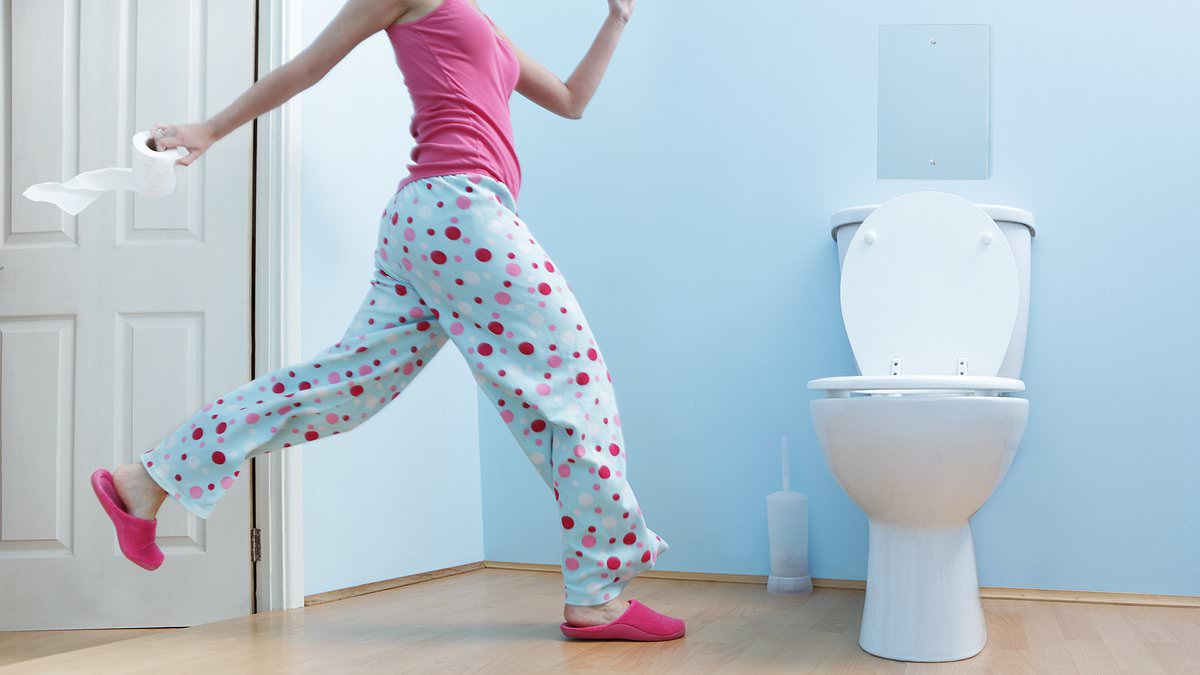I’m a 74-year-old woman and whenever I cough violently I feel like I need to go to the toilet.
It has got so bad that I rush to the bathroom every time I cough just in case.
Could this be a pelvic floor problem?

Dr Kaye says the pelvic floor can get weaker as you get older, particularly after the menopause
Dr Kaye replies: Leaking, be it stool or urine, is treated by many as a normal part of ageing but this is absolutely not the case. For women, the problem often stems from weakness in the pelvic floor – the hammock of muscles which sit in the pelvis and support organs such as the bowel, womb and bladder.
The pelvic floor can get weaker as you get older, particularly after the menopause.
It can also be affected by a chronic cough or constipation, which put pressure on these muscles.
Thankfully, there are ways to combat the problem.
A women’s health physiotherapist can provide exercises to strengthen the muscles, which helps reduce the leaks. If this doesn’t work, there are medicines which can reduce the urges. In some cases patients may be offered surgery, for example to treat a organ prolapse if that is contributing to the problem. These are all options patients can speak to their GP about.
I have recently been diagnosed with an underactive thyroid and prescribed a drug called thyroxin. But now I’m constantly too hot in bed which means I sweat and lose sleep. Is this a side effect of medication?
Dr Kaye replies: FEELING too hot or sweating is a common symptom of an underactive thyroid. Also known as hypothyroidism, it occurs when the body stops producing enough of the hormone thyroxine, which has functions including regulating body temperature.
Thyroxine is created in the thyroid gland – found in the neck – and the disorder is much more common in women. Alongside feeling too hot or too cold, people with an underactive thyroid may also experience fatigue and weight gain. The condition is normally treated with levothyroxine – also known as thyroxin – which replaces the lost hormone with an artifical version.
However, this medicine may cause patients to feel too hot in general, including at night.
The levothyroxine dose patients receive will fluctuate depending on how much their doctor believes they need. This can also change over time.
Someone who initially has only a mild form of hypothyroidism may see their condition get worse over a number of years, meaning they need a larger dose of levothyroxine.
For this reason, patients usually get a blood test every year to check their levels. If someone taking levothyroxine is still experiencing symptoms, they might need a larger dose, or they might need their dose reducing. This is something you can speak to your GP about.
I’m 74 and have a severe pain the right side of my head which I’ve had for more than two months. I was sent for an X-ray of my neck and spine and was told the results were ‘not bad considering my age’. I’ve been offered no treatment and the pain is keeping me up all night. What should I do?
Dr Kaye replies: There are many causes of headaches but, among older people, changes in the neck are a surprisingly common trigger. Most severe headaches are linked to migraines or cluster headaches.
It is unknown what triggers these conditions, but they are thought to be brought on by stress and fatigue. Both can lead to one-sided head and neck pain. Patients often report other symptoms such as dizziness, sight problems and difficulty speaking.
In recent years there have been a number of new drugs rolled out on the NHS which can reduce the risk of migraines occurring or reduce the symptoms once one begins.
However, migraines usually come and go, meaning that anyone who has constant head pain is likely to have a different problem.
This is due to arthritis in the neck, which leads to pain and stiffness, and could also radiate up into the head.
For older people, this typically occurs due to wear and tear of the joints over time – also known as osteoarthritis.
The condition can be both painful and restrict movement. Moreover, many patients say standard painkillers do little to help. However, there are other drugs to treat the pain of osteoarthritis.
These include the drug amitriptyline, which helps combat chronic pain and also makes it easier to sleep. It’s important that patients with head pain get a diagnosis – for example whether it is osteoarthritis – so they can know what the next step should be.
Patients with long-lasting pain can also see an NHS pain specialist, who can provide techniques on managing the uncomfortable sensation.
- Dr Ellie will be back next week. If you have a question for Dr Ellie Cannon, write to [email protected]
- Dr Kaye cannot enter into personal correspondence and her replies should be taken in a general context.
Image that shows vaping epidemic must be tackled
Britain’s biggest doctors’ union has demanded a total ban on all flavoured vapes in a bid to tackle the e-cigarette ‘epidemic’. I agree that action is needed urgently.
Figures show vaping among children rose almost six-fold in a decade – with often devastating consequences.
An 18-year-old in the US was recently put on life support with lung damage and pneumonia. Juliet Roberts, above, became ‘addicted’ to vaping having started aged just 14.
Vapes often come in flavours which appeal to children, but many adults who quit smoking and turn to vapes cite the enjoyable flavours as a reason they made the switch.
Banning flavoured vapes could ultimately lead to some returning to cigarettes – which is vastly more dangerous.
- Have vapes helped you quit smoking? Would you miss the flavours if they’re banned? Let me know your thoughts.










